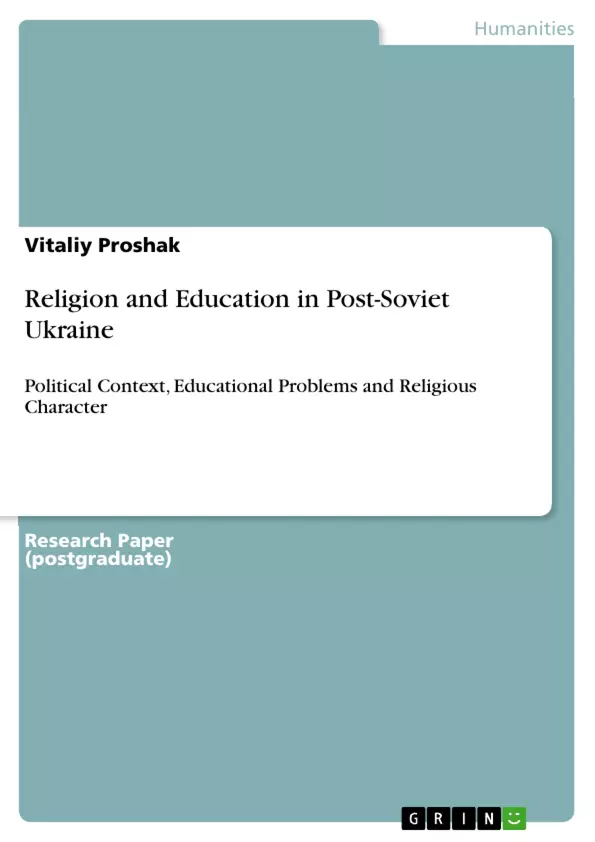The present publication describes the general trends and contemporary situation in religious education in secondary schools and institutions of higher education in contemporary Ukraine from the perspective of religion – state - society relations. Research areas of this study focus on political context, educational problems, and religious character of religious education in Ukrainian society.
Inhaltsverzeichnis (Table of Contents)
- INTRODUCTION
- KEY WORDS
- 1. Post-Soviet Rehabilitation of Religion and Religious Education in Ukraine: A Political Context
- 2. Contemporary Problems in Religious Education in Ukraine
- 3. Religious Character of Religious Education in Ukraine
- 3.1. Religious Education in Public Secondary Schools in Ukraine
- 3.2. Religious Education under Different Religious and Denomination Groups in Ukraine
- 3.2.1. Religious Education under Traditional and Protestant Christian Churches, Denominations, and Organizations
- 3.2.2. Religious Education under Minor Religious Groups
- 4. Summary
- BIBLIOGRAPHY
Zielsetzung und Themenschwerpunkte (Objectives and Key Themes)
This article delves into the contemporary landscape of religious education in Ukraine, exploring its interplay with the state and society. The central focus is on examining the political context, identifying educational challenges, and analyzing the religious nature of religious education within Ukrainian society. The research highlights the complexities of religious education in a post-Soviet context, particularly the challenges posed by the lack of state accreditation for religious educational institutions, inter and intra religious divisions, and the diverse religious landscape.
- The political context surrounding religious education in post-Soviet Ukraine
- Contemporary challenges faced in the implementation of religious education
- The impact of religious pluralism on the religious character of education
- The relationship between state, religion, and education in Ukraine
- The evolution of religious education from the Soviet era to the present
Zusammenfassung der Kapitel (Chapter Summaries)
- Chapter 1: Post-Soviet Rehabilitation of Religion and Religious Education in Ukraine: A Political Context This chapter discusses the dramatic shift in attitudes toward religion and religious education in Ukraine following its independence in 1991. It explores the revival of religious activities, including educational endeavors, by various religious groups and organizations, highlighting the transition from atheistic educational ideology to a more intellectual approach to religious studies. The chapter also examines the process of rehabilitation of religion from the negative image imposed by the Soviet regime.
- Chapter 2: Contemporary Problems in Religious Education in Ukraine This chapter focuses on the challenges faced by religious education in Ukraine, particularly the lack of state accreditation for religious educational institutions. It delves into the complexities arising from inter and intra religious divisions and the diverse religious landscape, analyzing the political debates surrounding the legal framework for religious organizations and their educational activities.
- Chapter 3: Religious Character of Religious Education in Ukraine This chapter explores the religious character of religious education in Ukraine, examining its implementation in both public and private educational settings. It analyzes the role of various religious and denomination groups in providing religious education and the challenges they face in navigating the diverse religious landscape. The chapter explores the different approaches to religious education adopted by various Christian churches, denominations, organizations, and minor religious groups.
Schlüsselwörter (Keywords)
The key terms that define this study include Ukraine, religion, education, religious education, politics, post-communism, liberal democracy, and religious pluralism. These keywords highlight the central themes and concepts explored within the context of religious education in a post-Soviet society.
- Arbeit zitieren
- Vitaliy Proshak (Autor:in), 2010, Religion and Education in Post-Soviet Ukraine, München, GRIN Verlag, https://www.grin.com/document/267251



